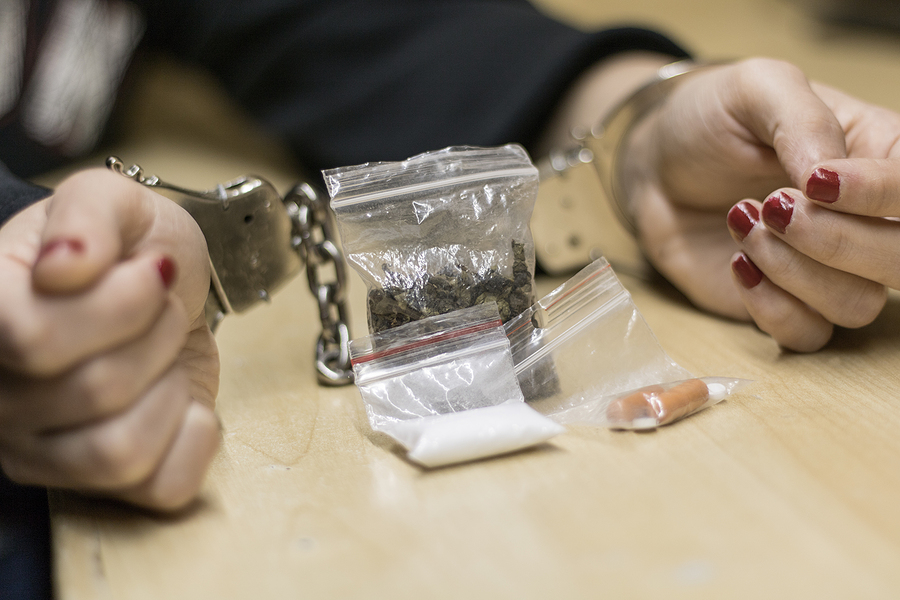Texas takes drug trafficking charges very seriously and penalizes convicted defendants harshly. If you or a loved one have been arrested for drug trafficking in Frisco, you should immediately reach out to an experienced criminal defenses attorney. These charges cannot be taken lightly.

What is Considered Drug Trafficking Under Texas Law?
According to the Texas Controlled Substances Act, drug trafficking is the manufacture, delivery, or possession with intent to deliver an illegal drug. It is prosecuted at the state level when the action takes place solely within Texas borders.
If there is no direct evidence you intended to distribute or sell the drugs found in your possession, the prosecution can still use circumstantial evidence to prove drug trafficking. For example, the state may argue that evidence of scales, baggies, cash, and ledgers indicate that you were planning to package and distribute a controlled substance.
What are the Penalties for Texas Drug Trafficking?
A conviction for this type of crime in Texas carries a felony sentence. The exact penalty depends on various factors, including the amount and type of drug. Texas classifies controlled substances into four penalty groups. Penalty Group 1 includes drugs considered the most dangerous and addictive, including heroin and cocaine. Penalty Group 4 includes drugs the state finds the least dangerous and addictive, like Xanax and Valium. The category of the penalty group and the amount of drugs will impact the severity of your penalty.
The penalties range from state jail felonies, punishable by six to two years in state jail and a fine of up to $10,000, to first-degree felonies punishable by 15 to 99 years in prison and fines of up to $250,000.
For example, below is a breakdown of the amounts and penalties for substances in Penalty Group 1.
• Less than 1 gram. Third-degree felony, punishable by two years to 10 years in prison and a fine of $10,000.
• Between 1 and 4 grams. Second-degree felony, punishable by two to 20 years in prison and a fine of $10,000.
• Between 4 and 200 grams. First-degree felony, punishable by five to 99 years in prison and a $10,000 fine.
• Between 200 and 400 grams. First-degree felony, punishable by ten years to life in prison and a fine of $100,000.
• Over 400 grams. First-degree felony, punishable by 15 years to life in prison, and fines up to $250,000.
In addition to jail time and fines, you may face a civil asset forfeiture lawsuit. A civil asset forfeiture is a tool used by law enforcement to seize an individual’s personal property if it is connected to criminal activity, such as drug trafficking. They can seize any type of property, including cash, cars, houses, boats, and farm equipment. A civil asset forfeiture suit is separate from your criminal case, and your property could end up being seized even if you are not convicted.
What is Federal Drug Trafficking?
Generally, drug trafficking under federal law is defined as the sale and distribution of illegal drugs. Drug trafficking is considered a federal crime when the act involves crossing state lines or the Mexican border.
What are the Penalties for Federal Drug Trafficking?
Federal penalties for drug trafficking are much more severe than state penalties. Prison sentences are typically longer, and fines can reach the millions. Like at the state level, federal sentences are heavily dependent on the type and amount of drugs involved. Penalties range from five years to life imprisonment. In addition to prison time, the court can order defendants to pay thousands to millions of dollars in fines. There are no mandatory minimum sentences for drug trafficking under federal law.
Penalties are increased under certain circumstances, such as if you have prior convictions or an individual was killed during the commission of the crime.
A felony conviction comes with life-altering collateral consequences. It can impact your professional career, educational opportunities, housing, immigration status, gun rights, and reputation in the community.
What Should You Do If You are Arrested for Drug Trafficking in Frisco?
If you are under investigation or have been arrested on drug trafficking charges, you should contact a qualified Frisco criminal defense attorney. Texas drug trafficking cases are complicated, and you will need experienced legal counsel to avoid harsh penalties. An attorney will thoroughly investigate your case and create an effective defense strategy. Having an aggressive attorney on your side is your best chance at protecting your freedom and having your charges dropped or reduced.
Your Frisco Criminal Defense Attorney
If you have been accused of drug trafficking, you should immediately reach out to an experienced criminal defense attorney. It is important to hire a criminal defense attorney in Frisco, Texas who will fight aggressively to protect your rights and build a strong defense. Call the Law Office of Philip D. Ray today at (469) 588-6770.
